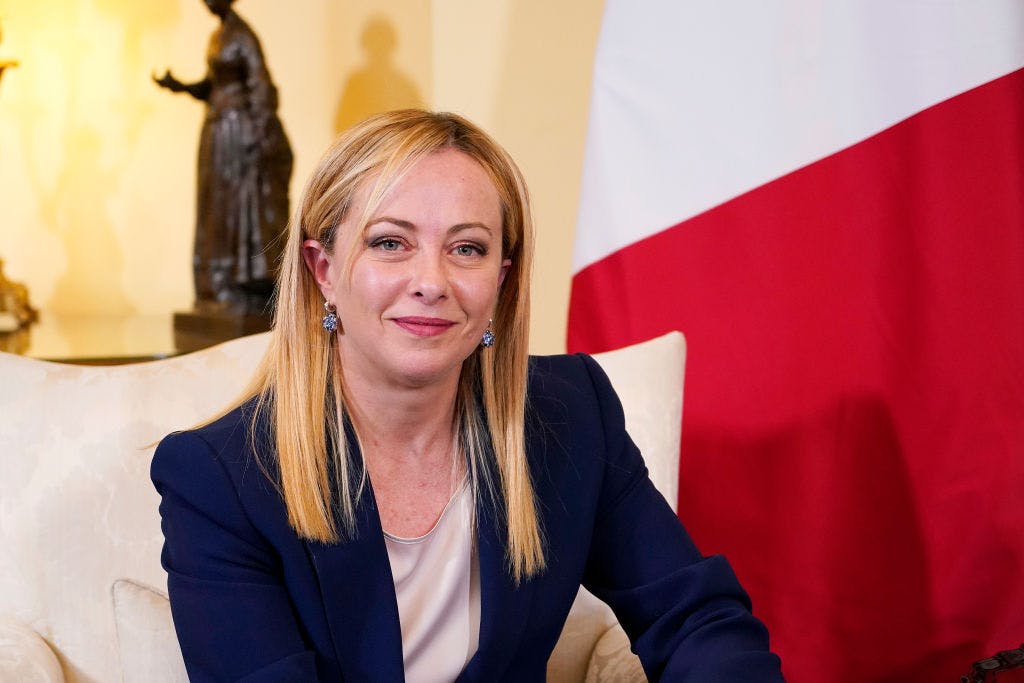Italy’s Meloni, After One Year in Power, Proposes To Upend the Political Apple Cart With the ‘Mother of All Reforms’
The rightist leader, seeing that the crazy-quilt jockeying for political power among the parties has caused an almost institutional instability that retards economic growth, calls for direct elections for prime minister.

The one-year mark of Giorgia Meloni’s premiership comes amid global turmoil abroad, between Israel’s war with Hamas and the Russo-Ukrainian conflict, and economic headwinds at home. Ideal timing, Ms. Meloni concludes, for constitutional reform — including direct elections for prime minister — to ensure more stability at the helm. She calls it “the mother of all reforms.”
Italy is not alone among the nations of the European Union finding themselves buffeted by swirling recessionary winds. Germany may already be in a recession. And France could easily follow. Though Italy’s annual inflation rate in October was the lowest since July 2021 — falling sharply to 1.8 percent, from 5.3 percent in September — economic growth was less than exhilarating.
The Eurozone’s third largest economy stagnated in the third quarter — narrowly averting what economists consider a technical recession, which is two consecutive quarters of falling GDP. The Italian National Institute of Statistics said that gross domestic product was unchanged from the previous three months, on the heels of a 0.4 percent contraction in the second quarter.
The disappointing performance is all the more reason to heed Ms. Meloni’s call for a Constitutional reformation. “We have a historic responsibility to consolidate the democracy of alternation” of governments,” she urges, “and finally take Italy into the Third Republic, with the Constitutional reform that this government intends to carry out.”
Under Italy’s present political system, which was created after the monarchy was replaced by a Republic after World War II, parties conduct talks leading to the formation of a government following a general election. The coalition that assembles a ruling majority in parliament then chooses a candidate for premier and presents that individual to the president.
Yet a vexing aspect of this process is that the figure selected as the prospective prime minister need not be one of the politicos who ran during the election campaign. Such a scenario runs contrary to the will of the electorate. Following the Tangentopoli scandal of the 1990s, Italy’s Second Republic arose, along with a new political establishment.
Yet the rules of the electoral game were still the same. Il bel Paese is currently in this Second Republic, the one that Ms. Meloni is endeavoring to overturn. Recently, Signora Meloni noted that “in the first twenty years of the millennium,” while France had 4 presidents of the republic and Germany 3 chancellors, Italy installed “11 presidents of the council of ministers.”
And whereas “France and Germany experienced 20 percent growth” during that period, she explained, “Italy’s economy grew at a rate of “less than 4 percent.” Clearly “there is something wrong with the system.” The crazy-quilt jockeying for political power among the parties leads to an almost institutional instability that retards economic growth. Consensus gives way to factionalism.
On Friday, the Meloni Administration introduced a reform bill aimed at securing the direct election of Italy’s prime minister, thereby ensuring greater political stability — and engendering stronger and more consistent economic growth. It would also buoy the markets’ overall perception of the Magic Boot. Predictably, the parties of the left emerged in opposition.
Giuseppe Conte’s Cinque Stelle and Elly Schlein’s Partito Democratico parties decry Prime Minister Meloni’s reform, invoking the specter of Benito Mussolini. Yet Ms. Meloni’s bid for a Third Republic is the antithesis of authoritarianism. It strengthens the citizenry rather than the political parties, serving the interest of the voters — not the denizens of Italy’s smoke-filled rooms.
Autocrats do exist in the Western alliance. And they are pernicious. One such leader is Turkey’s less than whip-smart president, Recep Tayyip Erdogan, who once averred that “Democracy is like a streetcar. We ride it as long as we can, and then get off.” The antisemitic Erdogan also recently declared that the terrorist group Hamas is a band of “liberators.”
Giorgia Meloni is a liberty-loving leader — and a staunch friend of Israel. She is no authoritarian. Her allegiance is to the people. Power to the people, not the pols. Moreover, it’s the stability, stupid. The president of Italy will no longer be able to anoint a technocratic or interim prime minister. Nor will Germany, France, or Brussels have the ability to topple a directly elected Italian government.
The premier must learn to sink or swim on his or her own merits. Even Matteo Renzi’s centrist Italia Viva party supports Ms. Meloni’s bill — though his fall from power in pursuit of a similar goal should be a cautionary tale for the premier. Ms. Meloni is upsetting Italy’s political apple cart. But a nation that has endured nearly 70 governments since World War II needs an overturning.

